 W
WCanning is a method of food preservation in which food is processed and sealed in an airtight container. Canning provides a shelf life that typically ranges from one to five years, although under specific circumstances, it can be much longer. A freeze-dried canned product, such as canned dried lentils, could last as long as 30 years in an edible state.
 W
W911 Foods or so-called "Emergency Gutom" is a ready-to-eat Halal canned food product made in the Philippines containing rice and chicken prepared for food assistance during disasters and firefights occurred that quickly distributed anywhere in the Philippines by Ana's Breeders Farm, Incorporated (ABFI) in partnership with the local government. It is now available commercially.
 W
WAyam Brand, sometimes simply known as Ayam, is a Singaporean multinational food conglomerate specialising in prepared foods, including seafood, canned fish and canned vegetables, especially baked beans. Ayam's product range focuses on Singaporean cuisine.
 W
WBaked beans is a dish traditionally containing white beans that are parboiled and then, in the US, baked in sauce at low temperature for a lengthy period. In the United Kingdom, the dish is sometimes baked, but usually stewed in sauce. Canned baked beans are not baked, but are cooked through a steam process.
 W
WThe Mason jar, named after American tinsmith John Landis Mason, who patented it in 1858, is a molded glass jar used in home canning to preserve food. The jar's mouth has a screw thread on its outer perimeter to accept a metal ring or "band". The band, when screwed down, presses a separate stamped steel disc-shaped lid against the jar's rim. An integral rubber ring on the underside of the lid creates a hermetic seal. The bands and lids usually come with new jars, but they are also sold separately. While the bands are reusable, the lids are intended for single-use when canning. Glass jars and metal lids are still commonly used in home canning while they have been largely supplanted by other methods for commercial canning.
 W
WBush Brothers and Company is a family-owned corporation best known for its Bush's Best brand canned baked beans. The company produces approximately 80 percent of the canned baked beans consumed in the United States, representing estimated annual sales in excess of $400 million and the processing of more than 55 million pounds of beans per year. In addition, the company also offers other canned beans, as well as peas, hominy, and cut green beans. Based in Knoxville, Tennessee, Bush Brothers operates plants in Augusta, Wisconsin and Chestnut Hill, Tennessee. Its canned goods are sold through retail food outlets and food service operators throughout the United States and Canada.
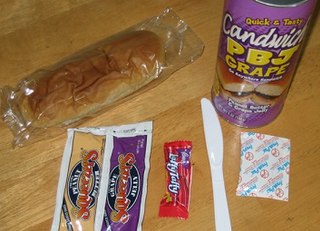 W
WCandwich is a canned food product created and produced by Mark One Foods, LLC. Candwich is marketed as "the only sandwich in a can." Its slogan is, "Quick & Tasty, Ready to Eat."
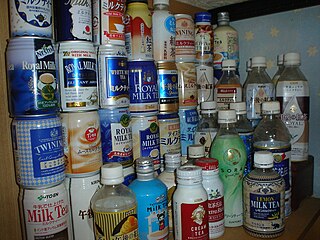 W
WCanned tea is a relatively recent method of marketing tea which has been sold traditionally as leaf tea and also, for the last 100 years, in tea bag form. It utilises the canning process to produce a ready made drink. Perceived advantages are ease of use and the possibility of additives ; the disadvantages are the cost of shipment and a lack of freshness.
 W
WCanned tomatoes, or tinned tomatoes, are tomatoes, usually peeled, that are sealed into a can after having been processed by heat.
 W
WChef Boyardee is an American brand of canned pasta products sold internationally by Conagra Brands. The company was founded by Italian immigrant Hector Boiardi in Milton, Pennsylvania, U.S., in 1928.
 W
WCondensed milk is cow's milk from which water has been removed. It is most often found with sugar added, in the form of sweetened condensed milk (SCM), to the extent that the terms "condensed milk" and "sweetened condensed milk" are often used interchangeably today. Sweetened condensed milk is a very thick, sweet product, which when canned can last for years without refrigeration if not opened. The product is used in numerous dessert dishes in many countries.
 W
WCoppola Foods is an Italian food family owned company with a heritage dating back to 1903 in the production and supply of Italian food products.
 W
WCreamed corn is a type of creamed vegetable dish made by combining pieces of whole sweetcorn with a soupy liquid of milky residue from pulped corn kernels scraped from the cob. Originating in Native American cuisine, it is now most commonly eaten in the Midwestern and Southern United States, as well as being used in the French Canadian dish pâté chinois. It is a soupy version of sweetcorn, and unlike other preparations of sweetcorn, creamed corn is partially puréed, releasing the liquid contents of the kernels.
 W
WA double seam is a canning process for sealing a tin can by mechanically interlocking the can body and a can end.
 W
WEvaporated milk, known in some countries as "unsweetened condensed milk", is a shelf-stable canned cow’s milk product where about 60% of the water has been removed from fresh milk. It differs from sweetened condensed milk, which contains added sugar. Sweetened condensed milk requires less processing to preserve since the added sugar inhibits bacterial growth. The production process involves the evaporation of 60% of the water from the milk, followed by homogenization, canning, and heat-sterilization.
 W
WFried dace with salted black beans is a canned food of Chinese origin. Cirrhinus molitorella (dace) is a fish from the Pearl River in China ‘Dace’ is a trade name of Cirrhinus molitorella while ‘salted black beans’ refer to fermented black soybeans known as “dau si” (豆豉) in Cantonese. Fried dace with salted black beans is made by combining dace with salted black beans and preserving it in oil afterwards.
 W
WGerber Singles was a failed product from 1974 by Gerber, a maker of baby food. It was food in glass jars targeted to college students and adults living on their own for the first time. According to Business Insider, Gerber believed that there was a market for single serving, ready to eat foods similar to ready-made baby food. Hoping that college students and other adults would purchase such foods if they were not labeled as "baby food" Gerber developed their "Singles" product. The "fatal flaw" and the reason the product flopped, is that "packages of meat mush didn't exactly scream "cool" to young singles." In January, 2012, an ABC show called Culture Click, called television's first modern-day social studies class, put it on the top ten failed ideas along with New Coke and Bic disposable underwear.
 W
WThe Calvo Group is a backward vertically integrated group of companies dedicated to fishing, processing and distribution of canned goods. The group is centred on Luis Calvo Sanz, S.A., a company established in 1940 in Carballo.
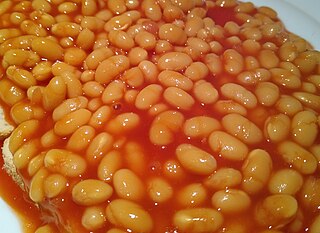 W
WHeinz Baked Beans are a brand of baked beans produced by the H. J. Heinz Company, and sold in the United Kingdom and other countries. They have been sold as "Heinz Beanz" since 2008.
 W
WHome canning or bottling, also known colloquially as putting up or processing, is the process of preserving foods, in particular, fruits, vegetables, and meats, by packing them into glass jars and then heating the jars to create a vacuum seal and kill the organisms that would create spoilage.
 W
WLongevity Brand is a brand of canned condensed milk, registered by FrieslandCampina and distributed by Sun Hing Foods, Inc. in the United States and Canada. It is a popular ingredient in Vietnamese iced coffee with milk drinks, and in various other Vietnamese desserts.
 W
WMaconochie was a stew of sliced turnips, carrots, potatoes, onions, haricot beans and beef in a thin broth, named after the Aberdeen Maconochie Company that produced it. It was a widely used food ration for British soldiers in the field during the Boer War and in front-line trenches during World War I. There was also a French version called Maconóochie.
 W
WThe Mason jar, named after American tinsmith John Landis Mason, who patented it in 1858, is a molded glass jar used in home canning to preserve food. The jar's mouth has a screw thread on its outer perimeter to accept a metal ring or "band". The band, when screwed down, presses a separate stamped steel disc-shaped lid against the jar's rim. An integral rubber ring on the underside of the lid creates a hermetic seal. The bands and lids usually come with new jars, but they are also sold separately. While the bands are reusable, the lids are intended for single-use when canning. Glass jars and metal lids are still commonly used in home canning while they have been largely supplanted by other methods for commercial canning.
 W
WPork and beans is a culinary dish that uses pork and beans as its main ingredients. Numerous variations exist, usually with a more specific name, such as Fabada Asturiana, Olla podrida, or American canned pork and beans.
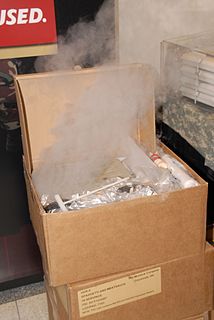 W
WSelf-heating food packaging is active packaging with the ability to heat food contents without external heat sources or power. Packets typically use an exothermic chemical reaction. Packets can also be self-cooling. These packages are useful for military operations, during natural disasters, or whenever conventional cooking is not available. These packages are often used to prepare main courses such as meat dishes, which are more palatable when hot.
 W
WSPC Global Limited, trading as SPC Australia and formerly SPC Ardmona, is an Australian-based company that specialises in large fruit packing and owns and operates a canning factory in Shepparton. SPCA closed its Mooroopna processing plant in 2011. It sold its Kyabram factory in 2019. It was owned by Coca-Cola Amatil from 2005 until 2019.
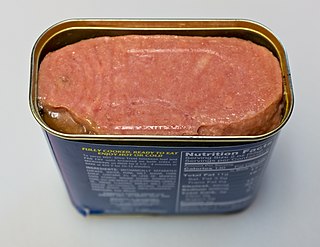 W
WTreet is a canned meat product similar to Spam first introduced in 1939 by Armour and Company in the United States. Sold as "spiced luncheon loaf", it is made with chicken and pork and has a more finely ground texture than Spam, more akin to bologna or vienna sausages. Like Spam, it is often fried or baked before consumption. Treet is currently manufactured by Pinnacle Foods.
 W
WA Weck jar is a molded glass jar used in canning to preserve food. It is popularly used for jam preservation, for its minimal look and foolproof rubber gasket with a glass lid.